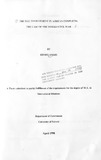| dc.description.abstract | This Study attempts to determine the extent to which the adherence to Article III of
the OAU Charter has conditioned the selective involvement of OAU in African civil wars and
in particular the extent to which this has been responsible for the low level of Involvement in
the Somali conflict (1991 - 1995).
In Chapter one, an attempt has been made to justify the study both as a policy guide
and in terms of its contribution to scholarship. It is useful not only to African policy makers
but also to the international community. It underlines the gaps, both in theory building and
literature, which the study is likely to fill. The review of the literature which has been done
in the same Chapter, has further emphasized the need to investigate the selective involvement
of the OAU in African Civil wars.
The study is guided by the systemic Theories of International Relations from which
one hypothesis is drawn, namely, that there is a positive correlation between the level of
threat to African regional status quo and the OAU's involvement in a given African civil war.
Our choice of the Systems Approach has also been-st.r~n&thened by the fact that the Somali
conflict took place in the wake of a shift in international power among the superpowers.
In terms of its methodology, the study has relied largely on secondary data and
qualitative rather than quantitative analysis of the data.
Chapter Two gives the historical background of the OAU, namely, the historical
evolution of Pan-Africanism and the latter's tendency to always prefer integrative tendencies
to the disintegrative ones. This background has been given in the belief that it provides a
good precedence for the subsequent selective involvement of the GAU in African civil wars.
Chapter Three relates the OAU Charter to Africa's historical experience on the one
hand, and to its desire to preserve the post-independence status quo on the other. The threat
to status quo is linked not only to the fragile international boundaries in Africa, but also to
the tendency of the former colonial powers, and the Cold-War protagonists to exploit African
differences for their own gains.
Chapter Four, is the main chapter of the thesis and is devoted to analysis of the
Somali conflict. The focus is to establish the extent to which the low level of involvement of
the OAU in the conflicts were a result of its low level of threat to the African regional status
quo. In it, the low level of involvement of the OAU has been made evident, together with
the high level of extra - African involvement, albeit at a later stage. As a result, the
systematic factors are linked not only to the OAU's low level of involvement, but also to the
delay in international involvement in general.
Chapter Five gives summaries, conclusions and some policy guidelines. The
conclusions point to the fact that the OAU's adherence to Article III of the OAU charter did
affect its involvement in the Somali conflict, although there were a number of intervening
factors which did moderate the conflict's level of threat to African regional status quo by
changing the notion of sovereignty on their part of the international community in general and
the OAU in particular. These include the proliferation of internal wars following the collapse
of the Soviet Bloc and the concomitant pressure on the international community to do more
for the resultant victims, and the IMF and World Bank Conditionalities which began to focus
on issues which had heretofore been viewed solely as the reserves of the state.
The policy recommendations are designed to reflect the policy relevance of the study
as contained in Chapter One. The major prescriptions underlined can be summarized as: self reliance
on the part of African States, transformation of international economic circumstances
which are deemed unfavorable to African States in particular, and the Third World in
general, political union as the panacea for Africa's colonial legacies of arbitrary boundaries
and uneven incorporation into the OAU's structural weaknesses with a view to making it
more responsive to African civil wars. | en |

